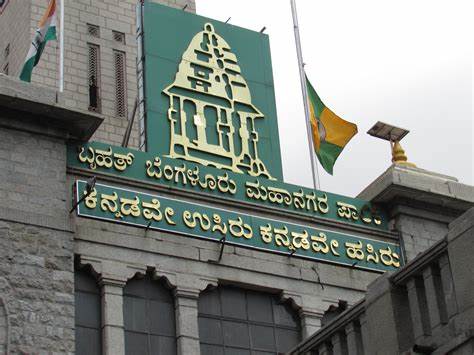The present property tax system is based on the Self-Assessment Scheme (SAS), which has been in vogue since 2008.

BBMP was officially formed on 16 January 2007, by merging the 100 wards of of seven City Municipal Councils. (Credit: Creative Commons)
The Bruhat Bengaluru Mahanagara Palike (BBMP), in its draft notification dated 20 February 2024, has significantly changed the method of determining the Unit Area Value (UAV) for arriving at the property taxes to be paid on different types of immovable properties.
The determining factor for the “tax” will be the properties’ latest official guidance value’.
The Stamps & Registration department launched an online platform, KAVERI, in Bengaluru in 2022 to calculate guidance values. Users can access it to ascertain their properties’ guidance values.
Rationale
The present property tax system is based on the Self-Assessment Scheme (SAS), which has been in vogue since 2008. It has 18 different categories of properties (residential, non-residential, commercial, empty site, composite units, etc., each further categorized under self-occupied, tenanted, etc.).
Bengaluru city is divided into six zones (residential/non-residential), each zone having a different tax rate. The built-up area is used as the basis for calculating the gross/ net annual UAV and tax as per the slab rate.
Suddenly, the BBMP woke up and stated that in the SAS, lakhs of citizens had wrongly declared their category/zones and faced penalties and recovery issues.
Further, the BBMP, in its Press Note, states that’ a low guidance value property in a high tax rate zone ( A or B zones) ends up paying more tax than a high guidance value property in a low rate tax zone (D, E, or F zones).’ According to the BBMP, this is irrational and unfair. All these hardships to the people were unknown to the BBMP for 12 years.
New System
According to BBMP, the new property tax system is the panacea for overcoming the above ills. It aims to simplify, rationalize, and introduce a fair property tax system, keeping individual “property guidance value” as the basis rather than a single tax rate based on some average guidance value in an area.
The new structure will have only six categories—residential, commercial, industrial, star hotel, exempted, and vacant land—and has eliminated the zoning system.
The average property tax hike under the new system will be around 6.7 percent, and for vacant land, it can be as high as 8.2 percent with a 10 per cent cap on the annual increases of property taxes.
Intent and timing questionable
What is most interesting is the timing of introducing the new property tax system and switching to the ‘guidance value’ methodology, which is dynamic and always northwards! So, an increase in property taxes on all categories of properties every year is imminent—though with a capping at 20% a year until it aligns with the tax payable under the notified scheme (other than vacant lands).
The manner in which the system has been introduced after steeply hiking the guidance value of all categories of properties a few months back and hiking the stamp duty/fees on certain legal documents / Deeds is a clear prelude to the launch of the new property tax system. It is a double whammy effect, with the candle burning at both ends.
To add insult to injury, the government / BBMP has announced a one-time settlement (OTS) for property tax defaulters. The OTS will include a nearly 50 percent reduction in penalties for property tax violations in Bengaluru. Tax penalties will be applicable only for a maximum period of five years and a total interest waiver for dues beyond five years.
Defaulters will gain ₹2,700 crore, and BBMP is expected to collect penalties worth ₹1,000 crore. The revenue loss due to the OTS’ haircut’ is a ridicule to honest taxpayers.
For revenue mop-up at any cost, the Notification equates B khata (B register as per Section 144(6) of the BBMP Act, 2020) and A khata on an equal pedestal by treating the guidance value applicable for both categories.
This is ridiculous when B Khata properties are under the scanner, and most banks and financial institutions are not extending loans for them since most of these lack infrastructure facilities, have construction violations, and can have title issues, too!
It may be recalled here that a former BBMP Commissioner had the nomenclature B khata as ‘bogus’ khatas!
This will also be tantamount to indirectly validating the B khata as legal, and taxpayers can approach the Courts for regularizing their B khata properties, which can have numerous construction violations under setbacks, additional floors, absence of approved building plans, multiple units, etc.
In its desperation to garner resources, BBMP is now all set to develop a new system under which property owners can pay property taxes without waiting for the khata certificates—for both A and B khata—under a self-declaration scheme. The BBMP said, ‘We allow people to pay tax and verify the details.’ This is nothing but putting the cart before the horse.
Actions required
The first step is to channel the efforts of the BBMP, BDA, and the government to recover thousands of crores in property tax arrears. Nearly 40 percent of owners are defaulters.
The next step is regularizing properties by introducing a proper ‘akrama sakrama’ scheme, which will fetch funds and solve Title issues.
To streamline administration, use “geo-mapping “to identify illegal structures, encroachments, and wrongly tagged property categories and collect tax arrears and penalties.
Finally, the tax collection mechanism must be streamlined by plugging loopholes and speed money menace.
It is appropriate for the BBMP / government to revisit the ‘scheme’ notification guidelines, develop a foolproof model, implement the system after general elections and the BBMP election, and not rush anything just to fill the treasury’s drying up coffers.
(The writer is a Bengaluru-based Banker, Economist and guest columnist. Views are personal.)
(Edited by VVP Sharma)

Jun 21, 2024

Jun 21, 2024

Jun 17, 2024

Jun 16, 2024

Jun 11, 2024

Jun 06, 2024